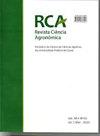Physiological response of black pepper (Piper nigrum L.) to deficit irrigation
IF 1
4区 农林科学
Q3 AGRICULTURE, MULTIDISCIPLINARY
引用次数: 1
Abstract
Due to the amount of water used in the agricultural sector, compared to other activities, irrigation must be done carefully and based on knowledge of plant water relations. The aim of this work was to evaluate the physiological behavior of young black pepper plants (Piper nigrum L.), subjected to water defi cit, as well as the potential for recovery after stress. In 5 L pots, the plants were subjected to different irrigation levels (100; 78; 58 and 32% of the control depth), with irrigation management performed by an automatic controller from a water tension sensor in the soil. The following traits were evaluated: leaf osmotic potential (Ψo), relative water content (RWC), stomatal conductance (gs) and photosynthetic pigments. To evaluate the plants’ recovery capacity, substrate rehydration was performed when about 50% of the plants in a treatment had stomatal conductance (gs) close to zero. The different levels of water defi cit reduced the values of all traits. In the treatment 32%, values of -2.39 MPa for Ψo, 60% for RWC and gs close to zero were observed on the 28 th day of water restriction. After three days of rehydration of this treatment, the recovery of these values was partial, not reaching the values of the treatments 100 and 78%. Black pepper plants showed high susceptibility to water restrictions and low capacity for recovery after stress.黑胡椒对亏缺灌溉的生理反应
与其他活动相比,由于农业部门的用水量很大,灌溉必须在了解植物水分关系的基础上谨慎进行。本研究的目的是评价黑胡椒幼苗在缺水条件下的生理行为以及胁迫后的恢复潜力。在5 L盆栽中,植株经受不同灌溉水平(100;78;58和32%的控制深度),灌溉管理由土壤中的水张力传感器的自动控制器执行。测定叶片渗透势(Ψo)、相对含水量(RWC)、气孔导度(gs)和光合色素等性状。为了评估植物的恢复能力,当处理中约50%的植物气孔导度(gs)接近于零时,进行底物再水化。不同程度的亏水降低了所有性状的值。限水第28天,32%处理的Ψo值为-2.39 MPa, 60%处理的RWC和gs值接近于零。该处理补液3天后,这些值的恢复是部分的,未达到处理的100和78%。黑胡椒植株对水分限制敏感性高,胁迫后恢复能力低。
本文章由计算机程序翻译,如有差异,请以英文原文为准。
求助全文
约1分钟内获得全文
求助全文
来源期刊

Revista Ciencia Agronomica
Agricultural and Biological Sciences-Horticulture
CiteScore
2.00
自引率
0.00%
发文量
41
审稿时长
4-8 weeks
期刊介绍:
To publish technical-scientific articles and study cases (original projects) that are not submitted to other journals, involving new researches and technologies in fields related to Agrarian Sciences. Articles concerning routine analysis, preliminary studies, technical notes and those which merely report laboratorial analysis employing traditional methodology will not be accepted for publication. The Journal of Agronomical Science also has the mission to promote the exchange of experience in the referred fields.
 求助内容:
求助内容: 应助结果提醒方式:
应助结果提醒方式:


